Matthew Aaron Goodman: Hold Love Strong
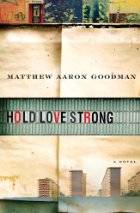 978-1416562030 – Hardcover – Simon & Schuster Touchstone – $24.99
978-1416562030 – Hardcover – Simon & Schuster Touchstone – $24.99
This is flat out one of the best books I have read in a long time. It begins with an incredible story that grabs you instantly and will not let go. I felt like I was holding my breath almost throughout the book. Matthew Aaron Goodman avoids cliches at every turn, loves his characters, demands respect for them from beginning to end, but never hides from the pain and suffering they experience. As readers, we feel like we are living in, through and with his characters, which is a triumph of both the author’s imagination and his deeply felt love for the people he writes about.
It’s difficult to believe that this is Goodman’s first novel. His mastery of language, his ability to inhabit the hearts and souls of his characters, and the simple clarity of his voice are all remarkable for any author, much less a first novelist. I was blown away, and have been recommending this book widely to friends and colleagues.
Cornel West gave it a very fine blurb that is worth reprinting here: “Matthew Aaron Goodman’s Hold Love Strong is a powerful and poignant story of the gallant Abraham who struggles on the night side of American society yet exudes a light of genuine hope. Goodman is an activist and artist who never loses sight of the humanity of those either imprisoned or free!”
I also recommend readers to visit Matthew’s own site where you can read some more of his work. In 2007, working hand and hand with formerly incarcerated men and women, Matthew created The Leadership Alliance, a community empowerment project that unites recently freed people with volunteer partners. And there is a wonderful review of Hold Love Strong by Nina Sankovitch on Readiac that I think describes perfectly the power and impact this book can have on readers.
In my interview with Matthew, we talked about his own life story to help understand how he came to write Hold Love Strong, the work he has done in New York communities and elsewhere, and alot about the book itself, its characters and story, and of course what he is working on now. He is as compelling talking about his work and ideas as he is writing about them.
Podcast: Play in new window | Download
Publishing Talks: David Wilk Interviews David Rothman
January 26, 2010 by David
Filed under PublishingTalks
 In this series of interviews, called Publishing Talks, I am talking to book industry professionals who have varying perspectives and thoughts about the future of publishing, books, and culture. This is a period of disruption and change for all media businesses.
In this series of interviews, called Publishing Talks, I am talking to book industry professionals who have varying perspectives and thoughts about the future of publishing, books, and culture. This is a period of disruption and change for all media businesses.
Publishing has been a crucial part of human culture for as long as people have been writing and reading.
How will publishing evolve as our culture is affected by technology, climate change, population density, and the ebb and flow of civilization and its economics? Publishing Talks interviews help us understand the outlines of what is happening, and how we might ourselves interact with and influence the future of publishing as it unfolds. Publishing Talks interviews give people in the book business a chance to talk about ideas and concerns in a public forum that are often only talked about “around the water cooler,” at industry conventions and events, and in emails between friends.
I hope that Publishing Talks interviews will give people inside and outside the book industry a chance to hear about some of the thoughts, ideas and concepts that are currently being discussed by engaged individuals within the industry.
David Rothman grew up in the D.C. area, went to the University of North Carolina and worked as a reporter for the Journal in Lorain, Ohio, where he covered poverty and public housing and was a feature writer. Among other stories, Rothman chronicled the aftermath of the Kent State massacre.
Related distantly to the late Hollywood scriptwriter Arnold Belgard, Rothman is the author of six nonfiction books on technology-related topics and lives with his wife, Carly, in Alexandria, Virginia. He is well known on the Internet and among digerati for having created and operated TeleRead, a popular site devoted to libraries and technology and recently has published a novel based on real-life Washington, D.C., The Solomon Scandals.
I talked with David Rothman about his long history of involvement in technology, the internet and digital reading alternatives, with emphasis on Teleread, and we then moved on to cover some of the current issues of the day, including the business structure of the rapidly growing e-publishing marketplace, copyright issues in the digital era, and how the web might enable new compensation models for authors and other creators. David displayed his typical verve and journalist’s willingness to tackle any subject and every challenge.
Podcast: Play in new window | Download
Jennifer Estep: Spider’s Bite
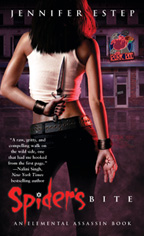 978-1439147979 – Mass Market Paperback – Pocket Books – $7.99
978-1439147979 – Mass Market Paperback – Pocket Books – $7.99
Jennifer Estep has written three books before this one, in an edgy paranormal romance series she called Bigtime. Spider’s Bite kicks off a new series, this one she calls urban fantasy, and I think the description is apt. It’s gritty, violent, tough, but full of love and a kind of self-defined punk-inspired love that has a depth and strength that is really admirable.
I know the book business likes to categorize books, sometimes quite narrowly, and there are good reasons for that. So this book falls into a category that Publishers Weekly calls “urban fantasy.” While I am not quite sure I know what that means, this novel is certainly a full on fantasy novel set in a city, so I guess that label fits in a literal way. But all labels and categories aside, author Estep has fashioned a terrific set of characters, in particular our hero, Gin. The first line of the book makes clear what we readers are getting into: “My name is Gin, and I kill people.” And she does, she is an assassin after all.
I was very impressed with Estep’s writing and she has fashioned a terrific story line. Some of the characters run to type, but they fit the story so well, we don’t mind. The author has set her imagination loose on the southeastern city in which the story takes place, maybe in our future, or maybe in an alternate universe, it’s wild and never dull. I’m looking forward to reading the sequels too.
Jennifer and I had a fun interview talking about this book, how she started as a writer and where her ideas come from. She’s a dedicated reader turned writer, and her love for books, ideas and writing shines through her work and her words.
See an excerpt from the book at chptr1.com. Visit Jennifer’s well put together site to learn more about her and her books.
Podcast: Play in new window | Download
Lew Paper: Perfect-Don Larsen’s Miraculous World Series Game and the Men who made it Happen
January 18, 2010 by David
Filed under Non-Fiction
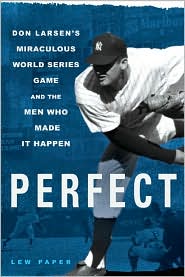
978-0451228192 – Hardcover – New American Library – $24.95
An entire book about one baseball game is probably unimaginable to many people. Even diehard fans, even those who feel they have heard the story of Don Larsen’s unique feat more than enough times, will be surprised at how easy this book is to (avidly) consume. Lew Paper manages to keep our attention, even though we know how the story comes out, even though we may know the game, the players, the era so well. And there are plenty of surprises in these pages.
Paper is a very good writer, almost effortless, and a he is a natural storyteller who plainly loves the material he is writing about. He uses the game as the structure for telling much more than the story of a single game, of course. He portrays many of the players in this game, Dodger greats like Jackie Robinson, Carl Furillo, Roy Campanella, Junior Gilliam, and hard-luck pitcher Sal Maglie, the powerful Yankee team of the fifties, which sported Mickey Mantle, Yogi Berra, Billy Martin, Gil McDougal, Moose Skowron and Hank Bauer, all in the prime of their careers. He brings to life the story of this great team rivalry between two boroughs of the greatest city on earth in the middle of the 1950s, an era that still can fascinate and enthrall us. And of course baseball is the constant through time, whose essence does not change at all.
It does help to be a baseball fan to like this book, I am sure, and maybe having grown up in or near this great era of intra-New York City competition adds to one’s interest as well. It was definitely a different time than today, when even star players held real jobs during the off season, and the amount of money won in a World Series could be just enough to give a player some modest luxuries and fleeting financial security. And of course many of these players had grown up during the Depression, lived through or even fought in World War II or the Korean War. That may account for some of the different attitudes and behaviors they exhibited on the field and among friends.
But there can be no doubt that Lew Paper has brought this game, these players, this era, vividly to life in a beautiful and brilliant manner. Talking to him about this book, the research he did to write it, and some of his experiences in talking to surviving players, relatives and witnesses to Don Larsen’s spectacular (and still unique) feat , was a great pleasure for me. I do love baseball, the game and its history have a terrific pull on me, as it does on many others, but baseball is also just a wonderful lens through which to see human beings, our culture, our foibles, our strengths and our desires. Thanks to Lew Paper for this book and a terrific interview about it.
Podcast: Play in new window | Download
Tom Matlack: The Good Men Project
January 15, 2010 by David
Filed under Non-Fiction
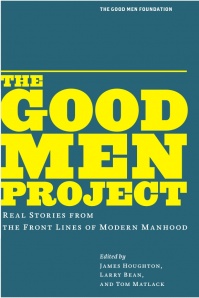 978-0615316741 – Paperback – The Good Men Foundation – $14.99
978-0615316741 – Paperback – The Good Men Foundation – $14.99
A bit more than year ago, longtime friends and former venture capitalist partners Tom Matlack and James Houghton began talking about exploring the meaning of manhood by getting men to share their stories. Today, the Good Men Project is a nonprofit foundation that benefits at-risk boys through the sales of its recently released book and a companion documentary, both titled “The Good Men Project: Real Stories from the Front Lines of Modern Manhood.” The book is a collection of 31 essays by men from all over the country, gay and straight, revealing experiences that are often harrowing but ultimately redemptive. There’s also a DVD of the film available.
Not long ago, I read a story about this book and the fact that the editors could not find a publisher (“no one wants to read about men”). Being entrepreneurs and successful business people, of course they went ahead and published the book themselves – and did a very nice job of it too. The book is divided into sections – Fathers, Sons, Husbands, Workers – pretty much all the categories that men will identify themselves at one time or another. The stories are powerful, emotional without being cloying or sentimental, transformative, in some cases, plain and simply the telling of personal truths that benefit others.
This is a new generation of men talking about their lives, and while some things are different for men certainly than they were in the era when talking about one’s emotional life was unimaginable and unaccepted, it’s still not easy for men to talk meaningfully about the real things that motivate them, or worry them, or even scare them deeply. The book certainly resonated with me, as I am sure it will for many men.
The Good Men Project is not, however, about therapy and simply talking to each other. There’s a real agenda here, to make a difference, to make change, to do good (The Good Men Foundation is a registered New York State 501(c)(3) charitable corporation dedicated to helping organizations that provide educational, social, financial or legal support to men and boys at risk. All proceeds from the sales of The Good Men Project: Real Stories from the Front Lines of Modern Manhood book and documentary film DVD will be distributed to the Foundation and will be used exclusively for the charitable mission of the Foundation).
The book features a wide range of writers, some professionals, many not. The writing is very good throughout. My interview with Tom Matlack covered alot of territory, including the story behind the whole project, and about this book, the other men who are involved with it, and how the Good Men Project works. This is a valuable effort that I hope will be broadly successful.
Podcast: Play in new window | Download
Publishing Talks: David Wilk interviews Tim O’Reilly
January 12, 2010 by David
Filed under PublishingTalks
 In this series of interviews, called Publishing Talks, I am talking to book industry professionals who have varying perspectives and thoughts about the future of publishing, books, and culture. This is a period of disruption and change for all media businesses.
In this series of interviews, called Publishing Talks, I am talking to book industry professionals who have varying perspectives and thoughts about the future of publishing, books, and culture. This is a period of disruption and change for all media businesses.
Publishing has been a crucial part of human culture for as long as people have been writing and reading. How will publishing evolve as our culture is affected by technology, climate change, population density, and the ebb and flow of civilization and its economics? Publishing Talks interviews help us understand the outlines of what is happening, and how we might ourselves interact with and influence the future of publishing as it unfolds. Publishing Talks interviews give people in the book business a chance to talk about ideas and concerns in a public forum that are often only talked about “around the water cooler,” at industry conventions and events, and in emails between friends.
I hope that Publishing Talks interviews will give people inside and outside the book industry a chance to hear about some of the thoughts, ideas and concepts that are currently being discussed by engaged individuals within the industry.
It was very exciting for me to have a chance to interview Tim O’Reilly, widely considered to be one of the smartest and most innovative publishers around. He’s been involved in the World Wide Web and computers for a very long time, and throughout that time, his work has been marked by intelligence, innovation, and clarity about what matters to consumers. We talked about the history of his involvement in publishing, the web, publishing technology, and his views about the way publishing needs to evolve using new digital tools and establishing new business models – with examples.
Here’s his bio: Tim O’Reilly is the founder and CEO of O’Reilly Media, thought by many to be the best computer book publisher in the world. The company also publishes online through the O’Reilly Network and hosts conferences on technology topics. Tim is an activist for open source, open standards, and sensible intellectual property laws.
Since 1978, Tim has led the company’s pursuit of its core goal: to be a catalyst for technology change by capturing and transmitting the knowledge of “alpha geeks” and other innovators. His active engagement with technology communities drives both the company’s product development and its marketing. Tim has built a culture where advocacy, meme-making, and evangelism are key tenets of the business philosophy.
Tim has served on the board of trustees for both the Internet Society and the Electronic Frontier Foundation, two organizations devoted to making sure that the internet fulfills its promise. He was on the board of Macromedia up until the recent merger with Adobe. He is currently on the board of CollabNet.
Tim graduated from Harvard College in 1975 with a B.A. cum laude in Classics. His honors thesis explored the tension between mysticism and logic in Plato’s dialogues.
An archive of Tim’s online articles, talks, and interviews can be found at Tim’s archive page.
Podcast: Play in new window | Download
Steve Berry: The Paris Vendetta
 978-0345505477 – Hardcover -Ballantine Books – $26.00
978-0345505477 – Hardcover -Ballantine Books – $26.00
Steve Berry’s latest adventure. The Paris Vendetta, is a terrific read, grounded in some pretty riveting historical mysteries, with a powerful story that grabs you right away and just will not let go. I really enjoyed reading it. Steve’s own description of the book (his site is one of the best author sites I have visited) is the best way to summarize the story without giving too much away:
When Napoleon Bonaparte died in exile in 1821, he took to the grave a powerful secret. As general and Emperor, he had stolen uncountable riches from palaces, national treasuries, even the Knights of Malta and the Vatican. In his final days, his British captors hoped to learn where the loot lay hidden. But he told them nothing and in his will he made no mention of his treasure.
Or did he?
Former-Justice Department operative Cotton Malone is about to find out after trouble comes knocking at his Copenhagen bookshop. Actually, it breaks and enters in the form of an American Secret Service agent with a pair of assassins on his heels. Malone has his doubts about the anxious young man, but narrowly surviving a ferocious firefight convinces him to follow his unexpected new ally.
Their first stop is the secluded estate of Malone’s good friend, Henrik Thorvaldsen. The wily Danish tycoon has uncovered the insidious plans of the Paris Club, a cabal of multi-millionaires bent on manipulating the global economy. Only by matching wits with a terrorist-for-hire, foiling a catastrophic attack, and plunging into a desperate hunt for Napoleon’s legendary lost treasure can Malone hope to avert international financial anarchy.
But Thorvaldsen’s real objective is much more personal: a vendetta to avenge the murder of his son by the larcenous aristocrat at the heart of the conspiracy. Which places Malone in an impossible quandary-one that forces him to choose between friend and country, past and present. Starting in Denmark, moving to England, and ending up in the storied streets and cathedrals of Paris, Malone plays a breathless game of duplicity and death, all to claim a prize of untold value.
I really enjoyed talking to Steve about The Paris Vendetta. Even though it’s the latest in a series he’s done featuring Cotton Malone, you definitely do not need to start at the beginning of the series. This book has all the requisite elements for readers who enjoy intelligent, historically grounded adventure novels; it’s almost impossible not to compare Berry to Dan Brown, and in my opinion, Berry is clearly the better writer. And as an added bonus, Steve is an author who can talk incisively about his own work. This interview should be fun for his many current fans as well as those who have never read his books.
Podcast: Play in new window | Download
Publishing Talks: David Wilk interviews Joe Esposito
January 5, 2010 by David
Filed under PublishingTalks
 In this series of interviews, called Publishing Talks, I am talking to book industry professionals who have varying perspectives and thoughts about the future of publishing, books, and culture. This is a period of disruption and change for all media businesses.
In this series of interviews, called Publishing Talks, I am talking to book industry professionals who have varying perspectives and thoughts about the future of publishing, books, and culture. This is a period of disruption and change for all media businesses.
Publishing has been a crucial part of human culture for as long as people have been writing and reading. How will publishing evolve as our culture is affected by technology, climate change, population density, and the ebb and flow of civilization and its economics? Publishing Talks interviews help us understand the outlines of what is happening, and how we might ourselves interact with and influence the future of publishing as it unfolds. Publishing Talks interviews give people in the book business a chance to talk about ideas and concerns in a public forum that are often only talked about “around the water cooler,” at industry conventions and events, and in emails between friends.
I hope that Publishing Talks interviews will give people inside and outside the book industry a chance to hear about some of the thoughts, ideas and concepts that are currently being discussed by engaged individuals within the industry.
I’ve been reading Joe Esposito’s writings about the book business – past, present and future – for quite some time with a great deal of admiration. He is smart, understands business, and cares deeply about books, ideas and people. Here is his “official” biography: Joseph J. Esposito is an independent consultant providing strategy assessment and interim management to the information industries. He has served as an executive at Simon & Schuster and Random House, as President of Merriam-Webster, and CEO of Encyclopaedia Britannica, where he was responsible for the launch of the first Internet service of its kind. Mr. Esposito has also served as CEO of Internet communications company Tribal Voice and SRI Consulting, both of which he led to successful exits. Among Mr. Esposito’s clients have been such technology companies as Microsoft and Hewlett Packard, various publishers of all stripes, and a growing number of not-for-profit organizations (e.g., JSTOR, the University of California Press, and the American Nationals Standards Institute). You can find his writing frequently at Scholarly Kitchen.
My interview with Joe covered alot of different subjects, including his background in publishing, current trends in digital media and e-reading, how publishing will change as it adapts to a digital marketing landscape. We spent a good deal of time talking about publishing strategy relating to e-book publishing, an issue that is important to many in the publishing industry today. His views and ideas, and his delivery of them, makes for a great conversation.
Podcast: Play in new window | Download
Joann Davis: The Book of the Shepherd
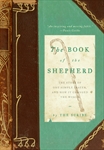 978-0061732300 – Hardcover – HarperCollins – $19.99
978-0061732300 – Hardcover – HarperCollins – $19.99
The Book of the Shepherd: The Story of One Simple Prayer and How it Changed the World is a beautifully written parable that made me think of writers like Paulo Coelho and Kahlil Gibran. The conceit of the book is that the author finds a manuscript in a house in Vermont, and has it translated, thus this story. It’s a short book, and an easy read, but of course, because it is a parable, the book demands to be re-read and thought about deeply.
The story has no distinct place or time. Joshua is the shepherd who is troubled by the code of “an eye for an eye” that governs his world. He has a dream about “a new way” and sets off on a quest to find it.
Stone the builder who erects a house that falls on its occupants. Sever the hands of the criminal who pilfers livestock or grain or another’s garment. Whip the child who defies an elder. For such is the law and the law must be obeyed.
For generations, these ironclad rules had governed the people. Nobody questioned whether it was right to humiliate a child or execute a murderer. An eye for an eye was the way of the world.
But was there another way?
Joshua is accompanied by Elizabeth, a former slave who is kind and generous, and David, a boy who must learn to walk in new shoes. Joshua believes that “an age of miracles” will come when the new way is found.
As with any quest, there is adventure along the way. En route to a cave near the Great Inland Sea, the travelers meet a number of interesting and compelling characters, including the Storyteller, the Apothecary, the Blind Man, and the Stranger. Each passes on an important lesson as the travelers journey toward what we realize is their destiny. At the cave, Joshua must see if he can bring forth secrets long buried. But he, Elizabeth, and David will discover that what they have been searching for has been inside them all along. In the end, The Book of the Shepherd is compelling and meaningful, whatever your political, social or religious outlook or beliefs. It’s not heavy handed or preachy, and even for many secularists, will be well worth the investment of time to read.
Joann Davis is an experienced writer and former book editor. She is extremely articulate and passionate about her work, and was a pleasure to interview. We talked about her work as a writer, her own spirituality, and how The Book of the Shepherd can change people and the world for good.
Podcast: Play in new window | Download
